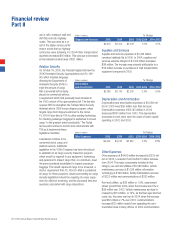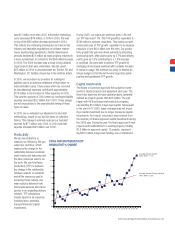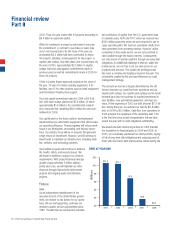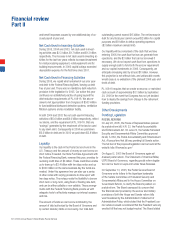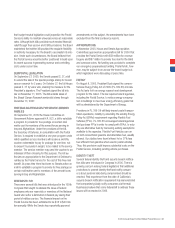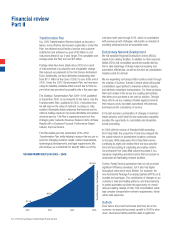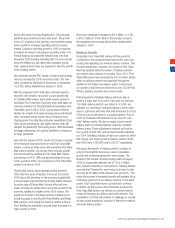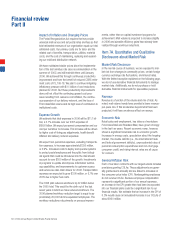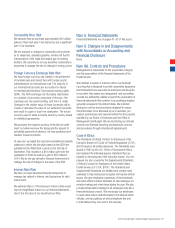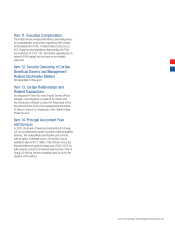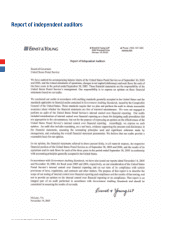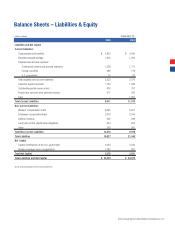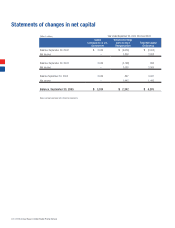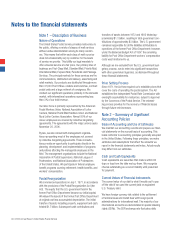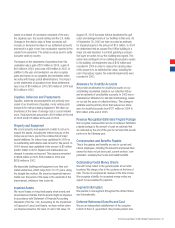US Postal Service 2005 Annual Report Download - page 47
Download and view the complete annual report
Please find page 47 of the 2005 US Postal Service annual report below. You can navigate through the pages in the report by either clicking on the pages listed below, or by using the keyword search tool below to find specific information within the annual report.
2005 Annual Report United States Postal Service | 37
Commodity Price Risk
We estimate that we purchase approximately 800 million
gallons of fuel each year. Thus fuel prices are a significant
part of our expenses.
We are exposed to changes in commodity prices primar-
ily for diesel fuel, unleaded gasoline, and aircraft fuel for
transportation of the mails and natural gas for heating
facilities. We currently do not use derivative commodity in-
struments to manage the risk of changes in energy prices.
Foreign Currency Exchange Rate Risk
We have foreign currency risk related to the settlement
of terminal dues and transit fees with foreign postal
administrations for international mail. The majority of
our international accounts are accounted for based
on International Monetary Fund special drawing rights
(SDR). The SDR exchange rate fluctuates daily based
on a basket of currencies comprised of the euro, the
Japanese yen, the pound sterling, and the U.S. dollar.
Changes in the relative value of these currencies will in-
crease or decrease the value of our settlement accounts
and result in a gain or loss from revaluation. The actual
currency used to settle accounts varies by country based
on individual agreements.
We purchase the required currency at the time of settle-
ment, but when we know the timing and the amount of
scheduled payments in advance, we may purchase short
duration forward contracts.
At year end, we adjust the reported receivable and payable
balances to reflect the fair value based on the SDR rate
published in the Wall Street Journal on the last day of
September. This resulted in a $10 million gain from the
revaluation in 2005 as well as a gain of $10 million in
2004. We do not use derivative financial instruments to
manage the risk of changes in the value of the SDR.
Interest Rate Risk
We have not used derivative financial instruments to
manage risk related to interest rate fluctuations for debt
instruments.
We estimate that a 1.0% increase in interest rates would
have an insignificant impact on our financial statements
due to the structure of our investment portfolio.
Item 8. Financial Statements
Financial statements are on pages 41–53 of this report.
Item 9. Changes in and Disagreements
with Accountants on Accounting and
Financial Disclosure
None.
Item 9A. Controls and Procedures
Management is responsible for the preparation, integrity,
and fair presentation of the financial statements of the
Postal Service.
We maintain a system of internal control over financial
reporting that is designed to provide reasonable assurance
that transactions are executed as authorized and accurate-
ly recorded, that assets are safeguarded, and accounting
records are sufficiently reliable to permit the preparation of
financial statements that conform to accounting principles
generally accepted in the United States. We maintain
disclosure controls and procedures designed to ensure
that information to be disclosed by us is recorded, pro-
cessed, summarized, and reported within the time periods
specified by our Board of Governors and the Office of
Management and Budget. We are monitoring our internal
controls over financial reporting and disclosure controls
and procedures through internal self-assessments.
Code of Ethics
The Standards of Ethical Conduct for Employees of the
Executive Branch at 5 Code of Federal Regulations (C.F.R.)
§2635 apply to all postal employees. The Standards were
issued in 1993 by the U.S. Office of Government Ethics,
and replaced the individual agency standards then ap-
plicable to all employees of the executive branch. Our em-
ployees are also covered by the Supplemental Standards
of Ethical Conduct for Employees of the United States
Postal Service at 5 C.F.R. §7001. The Standards and
Supplemental Standards are detailed and contain many
examples to help employees recognize and resolve ethical
issues. We give employees a summary of the standards,
and other ethical conduct materials, at new employee ori-
entation training and other times during the year. We also
provide annual ethics training for all employees who file a
financial disclosure report. We encourage our employees
to seek ethics advice and information from internal ethics
officials, and we publicize an ethics telephone line and
e-mail address they can use for this purpose.



